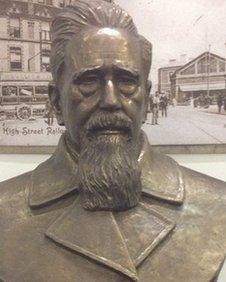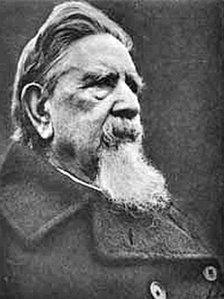Swansea-China missionary Griffith John bust on display
- Published

Griffith John founded the Wuhan Union Hospital during 50 years in China
A pioneering Welsh missionary in China has been honoured by the hospital he founded.
Griffith John spent more than 50 years working in Wuhan province before his death 100 years ago.
A delegation from Union Hospital, now a major medical research centre, is visiting John's home city Swansea where a bust will go on display.
His work is being recognised by Swansea University who aim to set up an exchange with their Chinese colleagues.
John, who died in 1912 aged 80, was born and raised in Swansea. He arrived in China in 1855.
After learning Chinese, he set up schools, hospitals and training colleges as well as pioneering the recruitment of Chinese people for missionary work in their own country.
He translated the New Testament in to a number of Chinese dialects and became a notable orator.
In later life, John was a leading opponent of the notorious opium trade.
He returned to Britain early in 1912 - only the third time he left China - and died in July that year. He is buried in Sketty, Swansea.
A street is also named after him in the Dyfatty area of the city.
Chinese artist Xiang Jinguo made the bust, which the delegation brought with them.
'Enduring popularity'
Nick Bradley, Swansea council's cabinet member for regeneration, said: "Griffith John is a key figure in Swansea's history and his commitment to education and healthcare in China in the 19th Century means he's still a revered figure there.

Griffith John was listed in the Who's Who in the Far East in 1907 for his pioneering Christian missionary work
"The fact a Chinese delegation has visited Swansea to present us with a commemorative bust of the man speaks volumes for his legacy and enduring popularity.
"The bust will now take permanent pride of place at Swansea Museum where it will add to a fascinating, ongoing exhibition about the life and times of Griffith John."
The exhibition includes artefacts which John himself donated to the museum, including a set of satin Chinese banners and ceremonial Chinese weapons.
On loan from the National Library of Wales are letters John sent from China as well as an original manuscript of his biography.
It is the first time the objects will be on public display.
On Friday, the Chinese delegation will visit Swansea University's School of Medicine, where they will sign a memorandum of understanding on future collaboration.
"We welcome our colleagues from China and hope to work closely with them in the coming years to establish a long-term programme of both undergraduate and postgraduate student teaching and exchange, scholar exchange and joint research and workshops," said Professor Keith Lloyd, had of the university's College of Medicine.
- Published27 October 2012